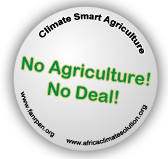 ACCID RSS newsfeed ACCID RSS newsfeed
Women Accessing Realigned Markets (WARM) Project
26 July 2012, AfriCAN Climate
URL: http://www.africanclimate.net/en/cases/women-accessing-realigned-markets-warm-project
The Women Accessing Realigned Markets (WARM) Project sought to strengthen the ability of women farmers to advocate for appropriate agricultural policies and programmes. The goal of the project was for women farmers to have access to assets, such as knowledge, technology, credit, better seeds, fertiliser and other inputs by ensuring that local, national and regional policies and services address their needs. The project was launched by the Food Agriculture and Natural Resources Policy Analysis Network (FANRPAN) in pilot sites in Malawi and Mozambique.
Agriculture is central to the livelihoods of the rural poor and in the attainment of the Millennium Development Goals (MDGs). Agricultural development is necessary for reducing poverty and food insecurity, and can be the engine of economic growth in Sub-Saharan Africa, where it contributes 35% of the gross domestic product (GDP) (FAO, 2009). According to FAO, women in Sub-Sahara African countries constitute 70% of the agricultural workers and provide 60-80% of the labour to produce food for household consumption and sale. They are also responsible for 100% of the processing of basic foodstuffs; 80% of food storage and transport from field to village; 90% of the hoeing and weeding work; and 60% of the harvesting and marketing activities (FAO Women and Population Division, 2007).
Efforts to improve agricultural and rural incomes often fail to address the specific needs of African women farmers. The WARM project was aimed at bridging the gaps between women farmers and policy processes, specifically with the goal of increasing women farmers’ access to input markets by empowering them to express their needs and by creating conducive research, policy environments. The WARM project used an innovative tool, Theatre for Policy Advocacy (TPA), which is a form of participatory theatre that allows women to engage their communities in developing solutions to their problems and to convey their concerns to traditional leaders, and local and national government officials. Women farmers were trained in policy advocacy.
The ultimate goal of WARM project was to empower women farmers and sensitize relevant decision-makers to women’s special needs so that they can gain better access to support services and input markets. The project had five objectives:
- To provide a platform for communities to dialogue on issues that affect women farmers’ access to input markets;
- To empower women farmers to play a more active role in driving the development agenda;
- To align development research agenda to women farmers’ issues;
- To align input supply institutions and programs to women farmer needs; and
- To bring women farmer concerns into national and regional policy debates.
|

